The electric vehicle communication controller (EVCC) market is projected to grow from USD 0.8 billion in 2025 to USD 3.6 billion by 2035, creating an absolute dollar opportunity of USD 2.8 billion over the forecast period. This strong growth is driven by increasing adoption of electric vehicles (EVs) globally, advancements in EV charging infrastructure, and the growing demand for robust communication systems in EV networks. In the first five-year phase (2025–2030), the market is expected to grow from USD 0.8 billion to USD 1.7 billion, adding USD 0.9 billion, which accounts for 32.1% of the total incremental growth, driven by strong adoption in EV markets and the establishment of charging networks.
The second phase (2030–2035) contributes USD 1.9 billion, representing 67.9% of the total growth, reflecting a surge in demand as EV adoption continues to rise and communication controllers become a critical component of advanced charging and vehicle-to-grid systems.
Annual increments will rise from USD 0.2 billion in early years to USD 0.5 billion by 2035, reflecting strong momentum driven by the rapid expansion of EV infrastructure, smart grid integration, and increasing vehicle electrification globally. Manufacturers focusing on advanced communication technologies and seamless integration will capture the largest share of this USD 2.8 billion opportunity.
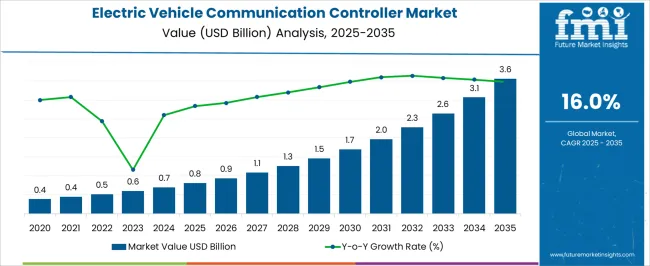
| Metric | Value |
|---|---|
| Electric Vehicle Communication Controller Market Estimated Value in (2025 E) | USD 0.8 billion |
| Electric Vehicle Communication Controller Market Forecast Value in (2035 F) | USD 3.6 billion |
| Forecast CAGR (2025 to 2035) | 16.0% |
The electric vehicle communication controller market is experiencing rapid expansion, fueled by the accelerating adoption of electric vehicles and the need for efficient communication between vehicles and charging infrastructure. Industry trends highlight the increasing integration of smart systems that manage charging processes to optimize energy usage and reduce charging time.
The growing focus on developing robust vehicle-to-grid and vehicle-to-infrastructure communication protocols has enhanced the role of communication controllers. Advances in system design have improved compatibility, security, and real-time data exchange, which are critical for the expanding EV ecosystem.
Regulatory frameworks promoting standardized charging and interoperability across manufacturers are further supporting market growth. Rising investments in passenger car electrification and charging network expansion are also significant drivers. The market’s future growth is expected to be led by EVCC systems, wired charging solutions, and applications within passenger cars due to their widespread adoption and technological advancements.
The electric vehicle communication controller market is segmented by system, charging, electric vehicleend-user, and geographic regions. By system of the electric vehicle communication controller market is divided into EVCC and SECC. In terms of charging of the electric vehicle communication controller market is classified into Wired and Wireless.
Based on electric vehicle of the electric vehicle communication controller market is segmented into Passenger Car, BEV, PHEV, Commercial Vehicle, BEV, and PHEV. By end-user of the electric vehicle communication controller market is segmented into OEMs, Aftermarket, and Charging Station Operators.
Regionally, the electric vehicle communication controller industry is classified into North America, Latin America, Western Europe, Eastern Europe, Balkan & Baltic Countries, Russia & Belarus, Central Asia, East Asia, South Asia & Pacific, and the Middle East & Africa.
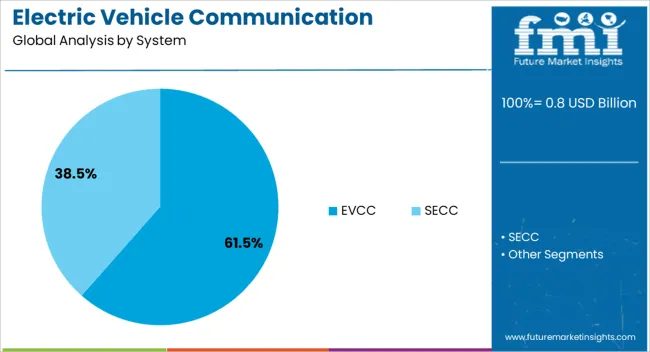
The EVCC system segment is projected to hold 61.5% of the electric vehicle communication controller market revenue in 2025, maintaining its dominance in system types. This segment’s growth is attributed to its essential role in managing communication between the electric vehicle and charging stations to ensure safe and efficient energy transfer.
The EVCC system facilitates crucial functions such as authentication, charging control, and fault management. Increased consumer demand for faster and smarter charging experiences has driven investments in EVCC technology enhancements.
Compatibility with international communication standards has also positioned EVCC systems as the preferred choice for automakers and charging infrastructure providers. As electric vehicle adoption accelerates globally, the EVCC segment is expected to continue its market leadership.
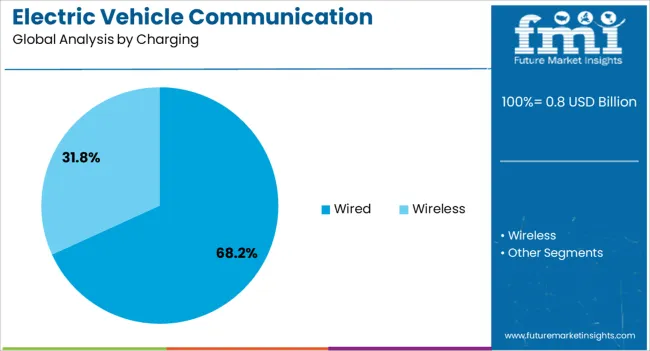
The Wired charging segment is projected to contribute 68.2% of the market revenue in 2025, establishing itself as the dominant charging type. Wired charging is favored due to its reliability, efficiency, and established infrastructure supporting a wide range of electric vehicle models.
It provides consistent power delivery with lower energy losses compared to wireless alternatives. Infrastructure providers and vehicle manufacturers have focused on enhancing wired charging technologies to support higher power levels and faster charging times.
Moreover, wired charging stations are more widely available across urban and highway locations, which strengthens their market share. Given the current maturity and cost-effectiveness of wired charging, this segment is expected to sustain its leading position in the foreseeable future.
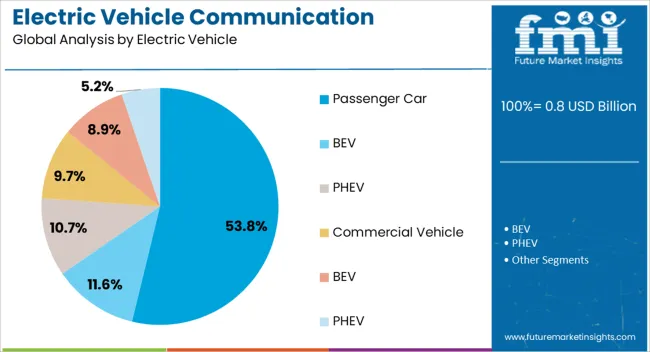
The Passenger Car segment is projected to hold 53.8% of the market revenue in 2025, maintaining its lead in vehicle applications. This dominance is linked to the rapidly growing electric passenger car fleet driven by consumer preferences for cleaner and more efficient transportation options.
Passenger cars account for the majority of new electric vehicle registrations globally. Communication controllers tailored for passenger cars have been optimized to support diverse charging scenarios, including home and public charging.
Government policies promoting passenger vehicle electrification and incentives have contributed to expanding this segment. As automakers continue to launch new electric models, the passenger car segment is expected to remain the primary focus for electric vehicle communication controller deployment.
The EV communication controller market is driven by the growing demand for efficient EV charging solutions and the expansion of charging networks. Opportunities in infrastructure development and emerging trends like V2G and smart charging are reshaping the market. However, high costs and integration challenges may hinder growth. By 2025, overcoming these obstacles through cost-effective solutions and infrastructure improvements will be critical for continued market expansion.
The electric vehicle (EV) communication controller market is growing due to the increasing demand for efficient and reliable EV charging solutions. EV communication controllers play a key role in managing the flow of power between the electric vehicle and charging stations, ensuring safe and optimized charging processes. As the number of electric vehicles on the road increases, the demand for advanced communication controllers in charging stations is expected to grow. By 2025, this demand will continue to rise, especially in regions expanding EV infrastructure.
Opportunities in the EV communication controller market are increasing with the expansion of EV infrastructure and charging networks. As more governments and private companies invest in charging stations, there is a growing need for intelligent and reliable communication systems that enable real-time monitoring and control. These systems ensure that electric vehicles charge efficiently and safely. By 2025, the growing number of public and private charging stations will significantly boost demand for EV communication controllers.
Emerging trends in the EV communication controller market include the rise of vehicle-to-grid (V2G) and smart charging solutions. V2G technology allows EVs to not only receive power from charging stations but also return power to the grid, enhancing energy management. Smart charging solutions enable users to monitor and optimize charging times, improving efficiency and reducing grid overloads. By 2025, these innovations will play a key role in shaping the future of electric vehicle charging.
Despite growth, challenges related to high implementation costs and infrastructure complexity remain in the EV communication controller market. The initial setup of advanced charging stations with communication controllers requires significant investment, particularly in terms of hardware and software integration. Furthermore, the complexity of integrating these systems into existing power grids can slow down deployment. By 2025, addressing these challenges through cost-effective solutions and streamlined infrastructure development will be essential for broader market adoption.
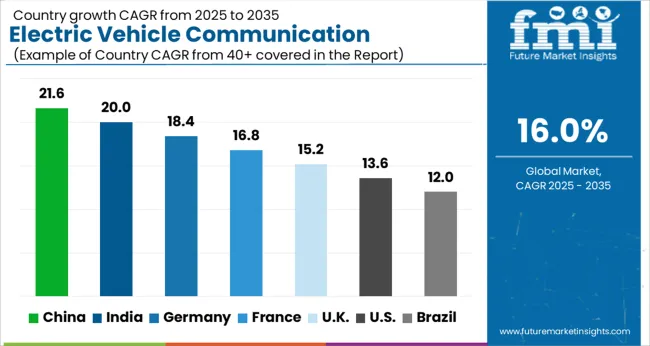
The global electric vehicle (EV) communication controller market is projected to grow at a 16% CAGR from 2025 to 2035. China leads with a growth rate of 21.6%, followed by India at 20.0%, and Germany at 18.4%. The United Kingdom records a growth rate of 15.2%, while the United States shows the slowest growth at 13.6%. These varying growth rates are driven by factors such as the rapid adoption of electric vehicles, the demand for smart charging solutions, and the need for seamless communication between EVs, charging stations, and grid systems.
Emerging markets like China and India are experiencing higher growth due to increasing government support for EV infrastructure, growing automotive industries, and expanding consumer adoption, while more mature markets like the USA and the UK see steady growth driven by the advancement of charging networks, regulatory incentives, and the transition toward cleaner transportation technologies. This report includes insights on 40+ countries; the top markets are shown here for reference.
The electric vehicle communication controller market in China is growing rapidly, with a projected CAGR of 21.6%. China’s ambitious government policies promoting electric vehicles, such as subsidies, tax incentives, and infrastructure investments, are driving the demand for EV communication controllers. The country’s rapidly expanding EV market, combined with the growth of charging infrastructure, is significantly contributing to the adoption of advanced communication controllers that enable efficient communication between electric vehicles, charging stations, and the power grid. Additionally, China’s push toward reducing carbon emissions and improving energy efficiency further accelerates the adoption of EV communication technologies.
The electric vehicle communication controller market in India is projected to grow at a CAGR of 20.0%. India’s increasing focus on clean energy, supported by government incentives for electric vehicles and the development of charging infrastructure, is driving the market for EV communication controllers. The country’s rapid adoption of electric vehicles in both urban and rural areas, along with a growing automotive industry, is contributing to the rising demand for advanced communication solutions to enhance the efficiency and reliability of EV charging systems. Additionally, India’s growing environmental awareness and push for sustainable transportation solutions are further accelerating market expansion.
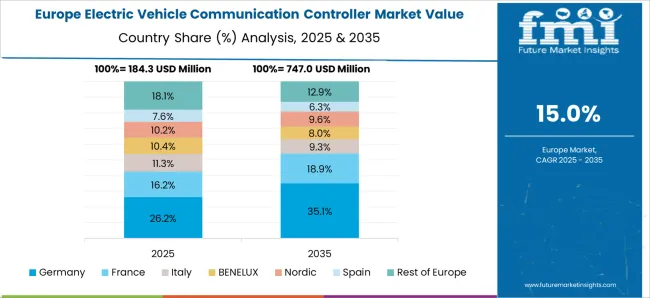
The electric vehicle communication controller market in Germany is projected to grow at a CAGR of 18.4%. Germany’s strong automotive industry and leadership in electric vehicle adoption in Europe contribute to steady demand for communication controllers in the EV sector. The country’s focus on enhancing EV infrastructure, including charging networks and smart grid technologies, is driving the adoption of advanced communication controllers to ensure seamless interaction between vehicles and charging systems. Additionally, Germany’s commitment to green energy policies, carbon neutrality, and its role as a major player in the European EV market further accelerate the demand for EV communication technologies.
The electric vehicle communication controller market in the United Kingdom is projected to grow at a CAGR of 15.2%. The UK’s growing demand for electric vehicles, supported by government incentives and commitments to reducing carbon emissions, is driving demand for efficient communication controllers. The expansion of charging infrastructure, particularly in urban areas, is further contributing to the adoption of communication technologies that enable seamless interaction between EVs and the grid. Additionally, the UK’s focus on building a sustainable and smart transportation ecosystem continues to push the demand for electric vehicle communication solutions.
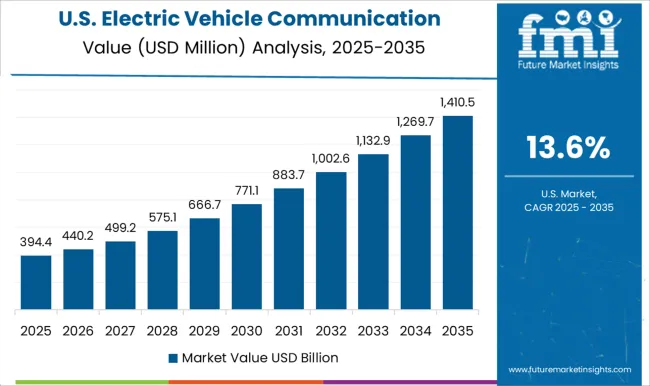
The electric vehicle communication controller market in the United States is expected to grow at a CAGR of 13.6%. The USA is experiencing steady growth in the adoption of electric vehicles, driven by environmental policies, incentives for EV buyers, and growing consumer interest in clean transportation. The expansion of EV charging infrastructure, particularly fast-charging stations, is further contributing to the demand for advanced communication controllers that ensure smooth and efficient interactions between vehicles and charging networks. Despite slower growth compared to emerging markets, the USA remains a key player in the EV sector due to its ongoing advancements in smart grid technologies and electric vehicle infrastructure.
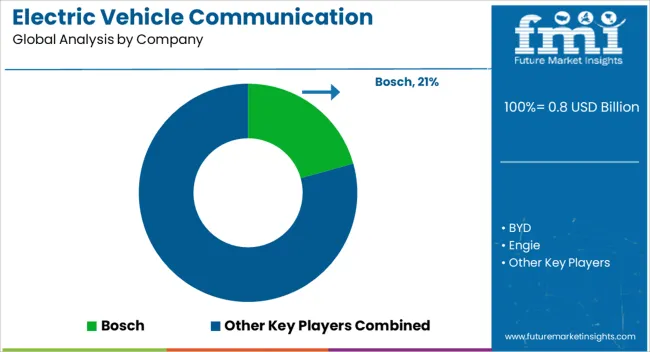
The electric vehicle communication controller market is dominated by Bosch, which leads with its advanced communication controller solutions designed to support seamless connectivity and efficient power management for electric vehicles (EVs). Bosch’s dominance is reinforced by its strong technological capabilities, broad market presence, and innovative contributions to smart grid integration and vehicle-to-grid (V2G) systems.
Key players such as BYD, LG Innotek, and Schneider Electric maintain significant market shares by offering cutting-edge communication controllers that enable effective EV charging, battery management, and real-time vehicle diagnostics. These companies focus on developing solutions that enhance charging infrastructure, optimize energy flow, and ensure safe and reliable communication between EVs, charging stations, and grids.
Emerging players like Engie, Siemens, and Tesla are expanding their market presence by offering tailored communication controllers designed to meet specific EV-related requirements, such as fast-charging solutions, integration with renewable energy sources, and real-time data analytics. Their strategies include improving interoperability, enhancing smart charging capabilities, and integrating advanced technologies like 5G for faster communication. Market growth is driven by the rising adoption of electric vehicles, the expansion of EV infrastructure, and the growing demand for efficient, smart communication systems that ensure seamless operation of electric vehicles and charging stations. Innovations in wireless communication, cybersecurity, and automated energy management are expected to continue shaping competitive dynamics and drive further growth in the global electric vehicle communication controller market.
| Item | Value |
|---|---|
| Quantitative Units | USD 0.8 Billion |
| System | EVCC and SECC |
| Charging | Wired and Wireless |
| Electric Vehicle | Passenger Car, BEV, PHEV, Commercial Vehicle, BEV, and PHEV |
| End-User | OEMs, Aftermarket, and Charging Station Operators |
| Regions Covered | North America, Europe, Asia-Pacific, Latin America, Middle East & Africa |
| Country Covered | United States, Canada, Germany, France, United Kingdom, China, Japan, India, Brazil, South Africa |
| Key Companies Profiled | Bosch, BYD, Engie, LG Innotek, Schneider Electric, Siemens, and Tesla |
| Additional Attributes | Dollar sales by controller type and application, demand dynamics across automotive, charging infrastructure, and smart grid sectors, regional trends in electric vehicle communication controller adoption, innovation in V2X (vehicle-to-everything) communication and wireless charging technologies, impact of regulatory standards on emissions and interoperability, and emerging use cases in autonomous vehicles and smart city integration. |
The global electric vehicle communication controller market is estimated to be valued at USD 0.8 billion in 2025.
The market size for the electric vehicle communication controller market is projected to reach USD 3.6 billion by 2035.
The electric vehicle communication controller market is expected to grow at a 16.0% CAGR between 2025 and 2035.
The key product types in electric vehicle communication controller market are evcc and secc.
In terms of charging, wired segment to command 68.2% share in the electric vehicle communication controller market in 2025.






Full Research Suite comprises of:
Market outlook & trends analysis
Interviews & case studies
Strategic recommendations
Vendor profiles & capabilities analysis
5-year forecasts
8 regions and 60+ country-level data splits
Market segment data splits
12 months of continuous data updates
DELIVERED AS:
PDF EXCEL ONLINE
Electrical Label Market Size and Share Forecast Outlook 2025 to 2035
Electric Round Sprinklers Market Size and Share Forecast Outlook 2025 to 2035
Electric Cloth Cutting Scissors Market Size and Share Forecast Outlook 2025 to 2035
Electrical Insulation Materials Market Size and Share Forecast Outlook 2025 to 2035
Electric Aircraft Sensors Market Size and Share Forecast Outlook 2025 to 2035
Electric Traction Motor Market Forecast Outlook 2025 to 2035
Electric Off-Road ATVs & UTVs Market Size and Share Forecast Outlook 2025 to 2035
Electric Blind Rivet Gun Market Size and Share Forecast Outlook 2025 to 2035
Electric Fireplace Market Size and Share Forecast Outlook 2025 to 2035
Electric Glider Market Size and Share Forecast Outlook 2025 to 2035
Electric Power Steering Motors Market Size and Share Forecast Outlook 2025 to 2035
Electric Motor Market Size and Share Forecast Outlook 2025 to 2035
Electric Gripper Market Size and Share Forecast Outlook 2025 to 2035
Electric Boat Market Size and Share Forecast Outlook 2025 to 2035
Electric Bicycle Market Size and Share Forecast Outlook 2025 to 2035
Electrical Enclosure Market Size and Share Forecast Outlook 2025 to 2035
Electrical Sub Panels Market Size and Share Forecast Outlook 2025 to 2035
Electric Cargo Bike Market Size and Share Forecast Outlook 2025 to 2035
Electrical Testing Services Market Size and Share Forecast Outlook 2025 to 2035
Electric Sub-meter Market Size and Share Forecast Outlook 2025 to 2035

Thank you!
You will receive an email from our Business Development Manager. Please be sure to check your SPAM/JUNK folder too.
Chat With
MaRIA